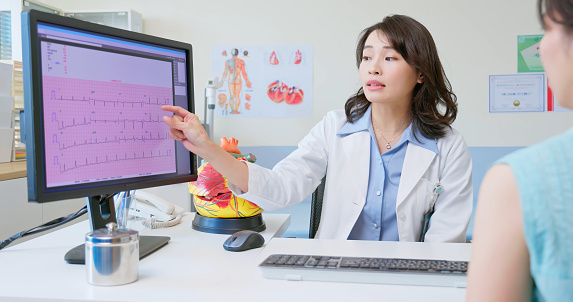Whether prompted by a referral, new symptoms, or a family history of heart disease, a first-time visit to a cardiologist can be daunting for many patients. Heart disease is still the leading cause of death in the United States, claiming nearly 700,000 lives each year – and that means taking care of your heart health is a top priority.
TopLine MD Alliance and our trusted network of cardiology providers hope to ease your concerns by providing a detailed overview of what to expect at your first cardiologist appointment, so you feel more prepared and empowered as you navigate your heart health journey.
This guide provides information on what to bring to your appointment, the diagnostic tests you may undergo, and how to make the most of your time with your provider. We also provide a list of questions to ask the cardiologist and offer guidance on taking a more active role in your heart health. For many, heart health awareness is the first step toward a healthier life.
It’s all part of TopLine MD Alliance’s commitment to proactive, patient-centered health that meets patients where they are and delivers accessible, informed care. So, let’s get to the heart of the matter.
What is the role of a cardiologist?
While primary care providers serve as your main point of contact – offering wellness and sick visits, managing chronic health conditions, and coordinating specialty care when needed – cardiologists focus solely on diagnosing and treating heart and blood vessel diseases that are critical to your well-being. Examples include:
- Hypertension – Also known as high blood pressure, hypertension can damage your blood vessels and lead to serious health problems like heart disease and stroke.
- Heart arrhythmia – Heart or cardiac arrhythmia is a condition where your heart beats too fast, too slow, or irregularly. Some arrhythmias are life-threatening and require immediate medical attention.
- Coronary artery disease – Coronary artery disease is a common type of heart disease that occurs when your coronary arteries narrow and become blocked, restricting blood flow to your heart. This disease is often caused by atherosclerosis, the buildup of plaque in your coronary arteries.
- Heart attack – A heart attack is a sudden event that occurs when blood flow to your heart is completely blocked, cutting off the oxygen your heart muscle needs to survive.
- Cardiomyopathy – Cardiomyopathy is a disease of the heart muscle that makes it harder for your heart to pump blood efficiently.
- Heart failure – Heart failure is a progressive condition that weakens your heart muscle to the point where it no longer pumps enough blood to nourish your body.
If your primary care provider finds any signs of a potential heart condition, they will likely refer you to a cardiologist. Your insurance plan may also allow you to reach out to a cardiologist directly, especially if you experience symptoms like chest pain, shortness of breath, heart palpitations, dizziness, or fainting, or if you have a family history of heart disease.
What should you bring to your first cardiologist appointment?
Being well-prepared and having detailed information prepared ahead of time helps you make the most of any doctor’s visit. As soon as your first cardiologist appointment is scheduled, you should begin gathering the following items:
- A medications list – Include all medications that you are currently taking, along with any medications you were prescribed within the past year. Your primary care provider or pharmacy should be able to put this information together for you if you don’t have it. Don’t forget to add vitamins and supplements as well.
- Your family’s medical history – Your family’s medical history is filled with clues about your risk for chronic health conditions, including heart disease, high blood pressure, and high cholesterol (another major risk factor for heart disease).
- Your own medical history – List any chronic health conditions, major medical procedures, and surgeries, plus diagnostic tests like MRIs and EKGs (more information about EKGs can be found below). If you have copies of recent lab results, bring those with you as well.
- A healthcare provider list – Include every medical provider you are currently seeing or have visited within the past two years, including dentists, chiropractors, and other holistic care providers.
- Your top questions – If you are visiting a cardiologist for the first time, you likely have a lot of questions. At a minimum, write down the five questions that you want answered most. You can use the list of questions below to get started.
What questions should you ask at your first cardiologist appointment?
Your heart health is personal, and not everyone will ask the same questions when they meet with a cardiologist for the first time. However, writing down a list of questions before your visit usually leads to a more productive appointment.
Here are some questions that you may want to consider:
What is my risk for heart disease?
Your cardiologist can utilize various resources to assess your personal risk of heart disease, including your medical history, blood pressure, cholesterol levels, weight, and other lifestyle factors.
What should my blood pressure and cholesterol levels be?
Knowing these numbers helps you monitor for changes, especially if you take your own blood pressure at home.
What tests are you ordering?
Find out why your cardiologist is ordering certain tests, what the results will tell them, and what the process will be like ahead of time.
Are there medications that can reduce my risk of heart disease?
Your cardiologist can explain the potential benefits and risks of any medications they suggest.
What lifestyle choices should I make to improve my heart health?
You cannot change your age, ethnicity, or family history. However, things like smoking, obesity, poor nutrition, being sedentary, and drinking alcohol are all dangerous for your heart health. Ask your cardiologist for specific recommendations.
How can I tell if I’m having a heart attack or a life-threatening heart event?
Learn what signs and symptoms to watch for and when to seek medical care immediately.
If you already have a heart condition, these questions may be helpful as well:
What caused my heart condition?
Understanding the cause of your heart condition is crucial to managing it effectively and preventing complications.
Are there any activities I should avoid?
Exercise is good for your overall health. However, if you have a heart condition, your cardiologist may advise you to avoid specific activities.
What treatment options are available for my heart condition?
Knowing all your treatment options helps you make informed choices and provides a better understanding of the medications, procedures, or lifestyle changes you may need in the future.
What symptoms could indicate that my condition is getting worse?
The symptoms of heart disease and other conditions can vary widely. Ask your cardiologist to explain any warning signs that are specific to you.
Will you need to fast before your first appointment with a cardiologist?
Fasting is not usually required for a standard appointment with a cardiologist. However, if your cardiologist orders certain types of tests or imaging, fasting may be necessary.
What should you expect during your first cardiologist appointment?
Your first cardiologist appointment typically lasts between 30 minutes and an hour. The cardiologist will ask about your medical history, symptoms, and lifestyle habits. Next, the cardiologist will conduct a physical examination, checking your weight, blood pressure, cholesterol, and other risk factors for heart disease.
If necessary, the cardiologist may order diagnostic tests and/or images of your heart. They will need to see these results before they can begin creating your care plan.
What tests might be done at my first cardiologist appointment?
The purpose of in-office testing is to ensure that you get the most accurate and complete diagnosis. Depending on the information your cardiologist needs, they may perform one or more of the following tests:
- Blood work – The cardiologist draws blood to test your cholesterol levels, take a blood count, and more.
- EKG – An EKG (electrocardiogram) uses electrodes stuck to your skin to measure your heart’s electrical activity.
- Cardiac stress test – A stress test also uses electrodes to monitor your heart’s electrical activity while exercising on a treadmill or stationary bike in staged intervals.
- Chest X-ray – A chest X-ray provides a detailed picture of your heart’s structures.
Now that you know what to expect at your first cardiologist appointment, it’s time to select the right one for you.
Find a TopLine MD Alliance Network cardiologist today.
The TopLine MD Alliance was created by physicians who came together to make healthcare experiences better for patients. We help patients navigate the healthcare system, connecting them with top-of-the-line healthcare providers, practices, diagnostic centers, and imaging centers we trust.
Cardiology is just one of many medical specialties we offer. To find a TopLine MD Alliance Network provider near you, visit us online today.
The TopLine MD Alliance is an association of independent physicians and medical practice groups who are committed to providing a higher standard of healthcare services. The members of the TopLine MD Alliance have no legal or financial relationship with one another. The TopLine MD Alliance brand has no formal corporate, financial or legal ties to any of the physicians or practice groups in the network.




